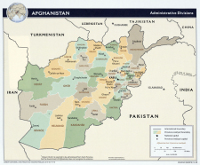Within the past few days, Coalition and Afghan forces have targeted al Qaeda-linked cells during raids in the Afghan north and east, while over the last several weeks, more than 90 Taliban fighters have been killed during clearing operations in central and eastern Afghanistan.
Combined Afghan and ISAF special operations teams recently struck at al Qaeda-linked cells in the provinces of Kunduz, Paktia, and Badakhshan.
In Kunduz district in Kunduz province, the combined force targeted an “al Qaeda-affiliated extremist” who is “connected to several insurgents groups in the area, including the Islamic Movement of Uzbekistan and the Taliban,” ISAF stated in a press release. According to ISAF, the target of the raid “was recently forced to leave his safe haven in Pakistan and moved to Takhar province with several al Qaeda members.” Nine “insurgents” were captured during the raid.
In Yahya Khel district in Paktika province, the special operations teams targeted a Taliban weapons facilitator who “works with Turkish foreign fighters.” While the Turkish foreign fighters were not identified, a group known as the Taifatul Mansura is known to operate in Afghanistan and is based across the border in Pakistan’s tribal areas. One Taliban fighter was detained in the raid.
In Badakhshan province, Afghan commandos, US Special Forces, and agents from the Drug Enforcement Agency and the Afghan National Interdiction Unit uncovered a massive weapons cache in the village of Nawci. The village is “suspected of being a safe haven for Taliban drug and weapon smugglers operating in the area and an infiltration route for foreign fighters operating throughout the northeast provinces of Afghanistan.” Hundreds of rockets, mortars, rocket-propelled grenades, and anti-aircraft guns were discovered at the village.
Al Qaeda maintains a strong presence in eastern Afghanistan, including in Kunduz, Takhar, Paktika, and Badakhshan provinces, according to an investigation by The Long War Journal.
In Kunduz, the presence of al Qaeda and allied groups’ cells has been detected in the districts of Kunduz, Chahar Darah, and Alibad; or three of Kunduz’s seven districts.
In Paktika, the presence of of al Qaeda and allied groups’ cells has been detected in the districts of Wor Mamay, Yahya Khel, and Ziruk; or three of Paktika’s 15 districts.
The presence of al Qaeda and allied groups’ cells has also been detected Takhar and Badakhshan provinces; the names of the districts in these provinces have not identified, however.
Al Qaeda’s extensive reach in Afghanistan is documented in the body of press releases issued in recent years by the International Security Assistance Force. Looking at press releases dating back to March 2007, The Long War Journal has been able to detect the presence of al Qaeda and affiliated groups such as the Islamic Movement of Uzbekistan in 52 different districts in 19 of Afghanistan’s 34 provinces [these numbers are updated as more information becomes available].
In other recent operations, ISAF and Afghan troops killed more than 90 Taliban fighters during operations in Kabul and Laghman provinces.
In Kabul, 40 Taliban fighters were killed during a six-day-long operation in the Uzbeen valley. More than 1,000 French, US, and Afghan troops air assaulted into the valley. The operation “was focused on clearing the area, rooting out enemy insurgent fighters, and securing and destroying illegal explosives and munitions.”
In Laghman, Afghan troops completed a three-week-long operation in Methar Lam, a region that was under the control of the Taliban. The combined force killed more than 50 Taliban fighters, ISAF stated in a press release. Thirteen Afghan soldiers and two policemen were reported killed, and several more were captured.
ISAF stated that eight Afghan soldiers were “repatriated,” indicating that they were killed in the fighting. But Major Patrick Seiber, the Public Affairs Director for Regional Command East told The Long War Journal that the soldiers were in fact alive. “The eight Afghan Soldiers returned to their unit alive after pressure from our combined forces caused the Taliban to release them,” Seiber said.
At the beginning of the operation, the Taliban, with the aid of al Qaeda’s military force, had blunted the initial battalion-sized assault by the Afghan Army, ambushing the main force while cutting off an air assault. US troops were called in to help the Afghan Army.
Sources:
• Afghan and coalition force detains suspected insurgents in Kunduz, ISAF press release
• Taliban IED facilitator targeted in Afghan, coalition operation, ISAF press release
• Afghan Commandos, US forces destroy weapons cache in Badakhshan, ISAF press release
• Joint ANSF, ISAF operation concludes with security gains, ISAF press release
• Afghan Army completes mission to account for missing soldiers, ISAF press release
• Taliban, al Qaeda forces repel Afghan Army assault in eastern Afghanistan, The Long War Journal








